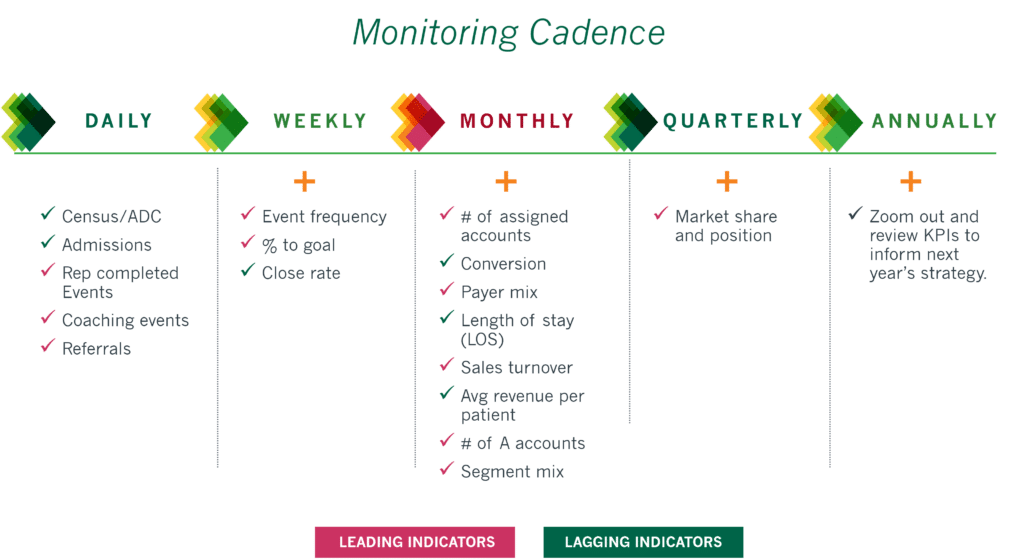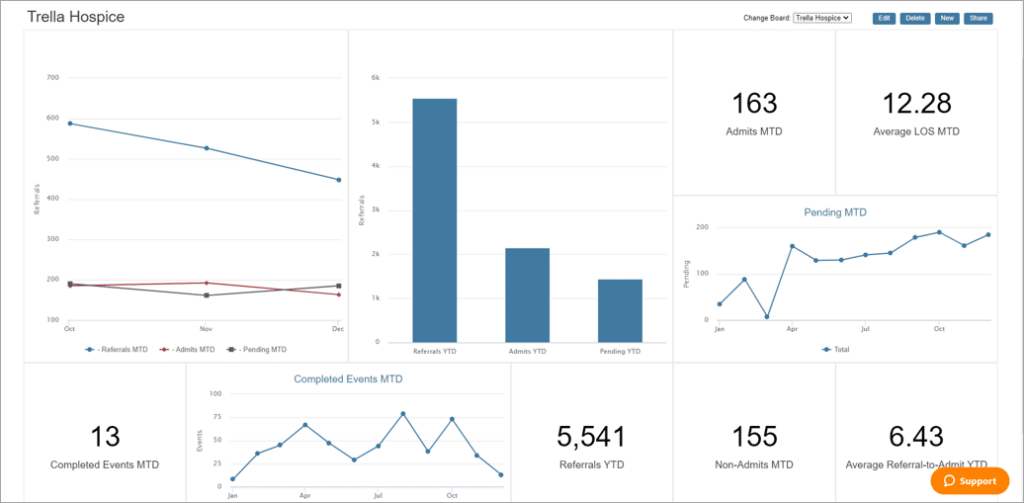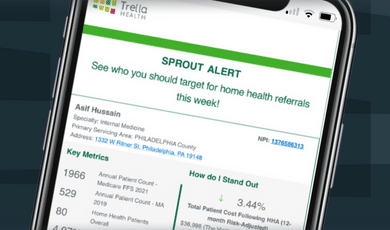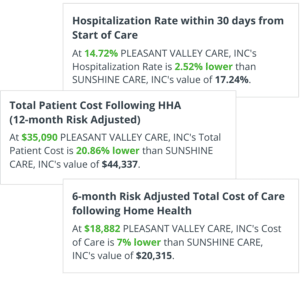In the highly competitive post-acute care industry, sales reps face the challenge of capturing the attention and trust of high-value referral sources.
When preparing to connect with a referral source in your market, your sales reps must consider this question: are they providing compelling market data and insights that the referral source needs to trust your organization as a partner?
Gone are the days when sales reps could show up with just coffee and donuts and expect to make a lasting impression. For your sales reps to stand out in your market and differentiate themselves from competitors – they need to understand and embrace the power of data-driven conversations.
As regulatory and financial pressures continue to threaten healthcare providers – your sales reps must effectively communicate how your organization helps them mitigate risk. Fortunately, data-driven conversations can offer a solution. By leveraging high-quality market insights and available data, your team can create evidence-based talk tracks that reflect your organization’s unique value and showcase how your organization can provide quality patient care and better outcomes over your competitors.
Throughout this article, you will unlock the secrets to mastering data-driven conversations. By implementing these strategies into your sales playbook – you and your sales team will learn how to effectively articulate your value propositions, build credibility, and address referral sources’ specific challenges and needs.
Let’s dive in!
Understanding Your Audience
Understanding your organization’s target audience and personas is critical to having successful data-driven conversations.
The goal of creating customer personas is to better understand your customers’ needs, behaviors, motivations, and pain points – empowering your sales reps to tailor messaging that resonates on a deeper level.
What is a persona?
A persona is a customer profile that includes their characteristics, success measures, and challenges. Personas represent an organization’s ideal customer or target within its market.
There are many roles within a patient care setting– think about the roles you are calling on and what motivates them.
Below are some examples by care setting:

How to map personas:
As you get started with building your personas, ask yourself:
- Who are you targeting in each care setting?
- What are their responsibilities?
- How is success measured in their role?
- What are the challenges they face?
- What motivates each of these roles to refer to post-acute services?
Follow this example template to outline each of your target personas.

Your Sales Reps Must Earn the Right to Have Data-Driven Conversations
Your reps need to create meaningful connections to get ahead of your competitors.
Before your reps can walk into a meeting, they must earn the right to have those conversations and showcase your organization’s unique value.
Keep reading below to uncover the essential who, what, when, where, why and how’s of data-driven conversations in the post-acute care industry:
- Who?
Post-acute care sales reps and leaders. - What?
Selling post-acute services today requires high-quality interactions with referral sources through data-driven conversations. - When?
Establish a meeting cadence based on the growth potential with each referral source target. See our blog on planning your account strategy for more information. - Where?
Every interaction with a referral source is an opportunity to share your value. - Why?
Empowered and confident reps drive more referrals. Earn the right to present your strengths and build credibility by presenting objective, data-backed evidence to support your value proposition. - How?
Provide your post-acute sales and marketing teams with the market insights and competitive metrics they need to capture the attention of high-quality referral partners – such as can be found in Trella’s Marketscape Insights solution.
Tip: The more your conversation resonates with the referral source – the more likely your organization will stand out above the competition.
Creating and Showcasing Your Unique Value
Once your reps have identified your target personas, it’s crucial to develop and execute effective plays that showcase your strengths, backed by data that proves your value to customers.
Let’s define what a play is and how your team can create effective plays.
What is a play?
A sales play is a predefined strategy used by sales teams to engage potential customers and drive sales. It outlines the steps, tactics, and messaging for the sales process.
Plays may involve activities such as:
- Prospecting
- Lead generation
- Cold calling
- Product demonstrations
- Presentations
- Negotiations
- Follow-ups
Sales plays have a critical role in a comprehensive sales strategy – acting as a guiding roadmap for sales teams throughout the intricate sales process. Their continuous refinement and optimization are informed by valuable feedback, emerging market trends, and invaluable customer insights.
To enhance your team’s prospecting activities – sales plays can harness the power of sales tools, compelling marketing materials, and valuable data insights.
By leveraging these resources, sales reps can effectively showcase your organization’s unique value and advantages – clearly demonstrating how you can directly address the challenges and aspirations of top referral sources.
Tip: Sales plays are adaptable and flexible, evolving alongside the ever-changing needs and preferences of your customers. This ensures that your strategies remain aligned with the dynamic landscape, maximizing your potential for success.
How to create plays
Now that a sales play is defined, let’s uncover to how create an effective sales play.
- Use data to know your strengths and how they align with the need of the defined persona.
- Craft your approach to earn the right to present your evidence-based solution.
Example: Using the Physician Persona, follow this example template outline your plays by persona.

Tip: As a Trella Health customer, you can utilize relevant Trella metrics and market insights so your team can confidently engage with referral sources.
Telling Your Story – Data that Resonates
Once you’ve created an outline for your sales plays – your team can utilize the market data and competitive insights available to you and construct a captivating narrative that illustrates your organization’s unique story.
Align your strengths with the needs of the persona
Data-driven insights serve as the building blocks for constructing a compelling and impactful story that sets your organization apart.
Below are examples of insights your sales reps can utilize to tell your story:
- Patient volume
- Top post-acute destinations
- Hospice Care Index (HCI)
- Post-acute utilization rates
- Average Medicare Days per Stay
- Risk scores
- Patient diagnostic mix
- Readmission rates
- Hospitalization rates
- Payer mix and volume
- Total cost of care
- Hospital affiliations
- Average length of stay (ALOS)
- Medicare Advantage claims
- Visits in the last 7 and 3 days
The metrics above serve as foundational elements for building a compelling and impactful story that showcases the unique value of your organization – with data – while speaking the referral’s language.
By leveraging these metrics, your team can effectively communicate your strengths and differentiate yourself in the market.
Tip: For Trella’s Marketspace Insights customers, you can leverage the Sales Spotlight feature to help build your talk track with data-driven messaging. Not a Trella customer? Request a FREE Sales Spotlight report sample.
Example:
How to Know Your Key Plays are Working
Are your sales plays yielding your organization’s desired results?
If your sales reps are encountering difficulties in the field, it may be time to step back and assess your Key Performance Indicators (KPIs) to establish a correlation between your team’s activities and their performance.
Let’s explore the essential KPIs to monitor and the platforms where you can effectively track them.
What KPIs should you track?
- Referrals
- Completed events
- Rep performance to goal
- Event frequency
- Coaching events
- Number of assigned accounts
- Number of “A” accounts
- Segment mix
- Sales turnover
- Payer mix
Additionally, it’s essential to establish a monitoring cadence to ensure your sales reps stay on track and achieve their goals.
Example:

TIP: To learn more about these essential KPIs, watch our webinar, Know Your KPIs: Key Performance Indicators to Drive Post Acute Success
Where to track it?
A Customer Relationship Management (CRM) platform integrated with market insights can offer a seamless solution for tracking and monitoring KPIs.
By leveraging reports and accessing your sales reps’ dashboards within your CRM, you can easily gain a comprehensive overview of their performance.
Example:

TIP: Marketscape CRM is fully integrated with Insights, plus it includes Sales Spotlight conversation starters with an on-the-go mobile app.
Consistently tracking and analyzing KPIs empowers you to make data-driven decisions, identify areas of improvement, and optimize your sales strategies. By monitoring your team’s performance, you can proactively address challenges, enhance productivity, and drive better sales outcomes.
Always be coaching
To enable your sales reps to efficiently and effectively excel in their data-driven conversations, it’s essential to establish and implement effective coaching practices.
By providing ongoing training and keeping them updated on industry trends and communication strategies, you can equip them with the necessary skills and knowledge to succeed.
Consider implementing the following coaching practices to help your sales team development:
- Continuous Training
- Role-Playing Exercises
- Foster a Data-Driven Culture
- Constructive Feedback and Guidance
- Foster Collaboration
By implementing these coaching best practices, you can empower your sales reps to drive impactful conversations, build strong relationships with prospects, and achieve meaningful outcomes for your organization.
Continuous training, role-playing exercises, a data-driven culture, constructive feedback, and collaboration cultivate a high-performing sales team that consistently delivers exceptional results.
Next Steps
As we’ve discussed extensively in this blog, your sales reps must capture the attention and engage top referral sources. In addition to the traditional approach of just coffee and donuts, incorporating data-driven conversations with these treats showcases your organization’s unique value and fosters a foundation of trust with them.
As the healthcare industry faces growing regulatory and financial headwinds, it becomes even more crucial for your sales reps to integrate data-driven conversations into their talk track when meeting with top referral sources.
By utilizing the insights shared in this blog into your sales playbook – your sales team will be well-prepared to effectively articulate your value propositions, build credibility, and address referral sources’ specific challenges and needs.
Want to learn more about data-driven conversations?
Request a personalized demo today at https://www.trellahealth.com/demo.















